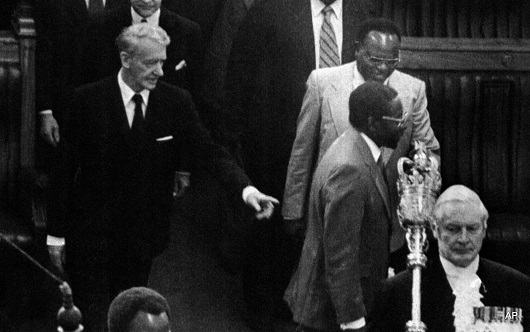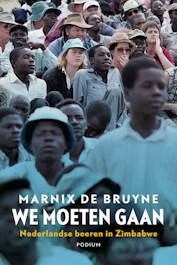Zimbabwe
About Andrew Cusack
 Writer, web designer, etc.; born in New York; educated in Argentina, Scotland, and South Africa; now based in London.
Writer, web designer, etc.; born in New York; educated in Argentina, Scotland, and South Africa; now based in London. read more
News
Blogs
Reviews & Periodicals
Arts & Design
World
France
Mitteleuropa
Knickerbockers
Argentina
The Levant
Africa
Cape of Good Hope
Netherlands
Scandinavia
Québec
India
Muscovy
Germany
Academica
Mugabe and Friends
The recent election (such as it was) in Zimbabwe brought to mind the Nando’s television advert of Robert Mugabe and his old mates.
Gaddafi, Mao, Saddam, and Idi Amin all make an appearance, and even (somewhat incongruously) die ou krokodil, P.W. Botha.
“Events did not choose the terrorists; powerful white people did.”
Helen Andrews on Zimbabwe

Robert Mugabe leading Ian Smith into the Zimbabwean parliament, 1980.
It is rare to find journalism as informed and insightful as this piece on Zimbabwe by Helen Andrews in National Review. In the aftermath of Mugabe’s clumsy downfall and his succession by a powerful apparatchik and experienced political operator, Helen explores the Rhodesian crisis and attempts to answer the question: could it really have gone any other way?
Any idea that liberal reform on the part of the Rhodesian state could have saved it is a non-starter, because the anti-imperialists were implacable and — I do not know a gentle way to put this — they were quite happy to lie. I do not mean just the professional liars of the Soviet propaganda shop, or the pundits who lazily referred to the Rhodesian system as “apartheid,” or the guerrillas who told Shona villagers that ZANU had successfully dynamited the Kariba Dam, or the foreign journalist who scattered candy around a garbage bin and captioned the resulting photo “Starving children searching for food in Salisbury.” Ralph Bunche had a doctorate from Harvard, a Nobel Peace Prize, and a co-author credit on the Universal Declaration of Human Rights, and when it came to imperialism, he lied.
“Colonial authorities like the noted Englishman, Lord Lugard, doubt that the African race, whether in Africa or America, can develop capability for self-government.” When I first read that in Bunche’s 1936 pamphlet “A World View of Race,” I felt a lurking suspicion that I had read a sentence of Lord Lugard’s beginning with the very words “The method of their progress toward self-government lies…” I had. His next words are “along the same path as that of Europeans.” Even making allowances for CTRL-F’s not having been invented yet, Bunche’s remark is plain slander. With Harvard Ph.D.s pulling stunts like this, it is hard to summon much indignation at a garden-variety diplomatic lie like the U.N. claim, by which sanctions were justified, that Rhodesia had committed an act of aggression by maintaining its status quo.
She does go a little easy on Smith, who despite his many strengths was just as willing to play fast and easy with the truth. (He was a politician, after all.) But then as we are so used to hearing that Smithie was a little Hitler it’s a welcome restorative.
When I moved to South Africa, I did so at least in part because I wanted to see it before it became “the next Zimbabwe”. Having come back, I was impressed by the relative robustness of many of its institutions, and the certain robustness of many of its people. Rather than a Zimbabwe-style collapse, South Africa seemed destined for a slow, ungainly descent into perpetual malaise.
The recent ascent of Cyril Ramaphosa – who on behalf of the ANC ran rings round the NP negotiators during the transition talks of the early ’90s – gives hope to many. I’m too cautious to be optimistic, but Mr Ramaphosa is clever, intelligent, skilful, and more likelier to keep the unions on side.
The Dutch in Rhodesia
…and why they stayed there.
 Journalist Marnix de Bruyne has shed new light on the post-war wave of Dutch immigration to Rhodesia with his new book, We moeten gaan. Nederlandse boeren in Zimbabwe (‘We Must Go: Dutch Farmers in Zimbabwe’).
Journalist Marnix de Bruyne has shed new light on the post-war wave of Dutch immigration to Rhodesia with his new book, We moeten gaan. Nederlandse boeren in Zimbabwe (‘We Must Go: Dutch Farmers in Zimbabwe’).
Why did so many people emigrate from the Netherlands in the fifties? Why did hundreds of them choose to settle in what was then called Rhodesia, today’s Zimbabwe? And why did so many of them stay after 1965, when the country was led by a white-minority regime, faced an international boycott and was engulfed in a bloody guerrilla war?
De Bruyne attempted to answer these questions through a recent seminar at Leiden University’s African Studies Centre. The university has rather handily made a recording of the seminar available online.
Daar’s ook ’n interview (in Nederlands) met Mnr de Bruyne in Mare, die koerant van die Universiteit Leiden.
(Dave: hierdie post is vir jy!)
The Epiphany 6 January 2016

Architectural historian Gavin Stamp argues that if Rhodes really was such a vicious baddie as his opponents claim, why stop with just removing his statue?
South African academic and Rhodes scholar R. W. Johnson has compared the campaign to remove Rhodes statues to ISIL’s destruction of antiquities in the Middle East while clerical commentator Fr Alexander Lucie-Smith recalls the damnatio memoriae.
Most interesting perhaps is the treatment of Rhodes not in the ivory towers of Oxford or Cape Town but in the land that once bore his name. Rhodes’s grave still lies in a prominent spot in the Motopos, but even President Robert Mugabe is against exhuming him.
From the Telegraph:
The last time that a call was made for the grave in the Matopos to be exhumed, Middleton Nyoni, then Town Clerk of Bulawayo, offered a telling response. “It is the Taliban who destroy history – and I am not a Taliban,” he declared. “After Rhodes’s grave, who is next?”
When Rhodesia became Zimbabwe in 1980, the city fathers of Bulawayo shifted Rhodes’s statue from the town centre to the town museum, while covering up the plaque commemorating his indaba with the chiefs of the Matabele. But in 2010 the city council voted to uncover the plaque while last year the Zimbabwean playwright Cont Mhlanga provocatively suggested returning Bulawayo’s statue of Rhodes to its former place of prominence.
U.C.T. has dumped Rhodes – though he remains elsewhere on Table Mountain – and his statue is still at Oriel… for now.
– This time last year, Pascal-Emmanuel Gobry asked if the Christian revival was starting in France. My pilgrimage to Chartres provided me with evidence that the faith across the Channel is deep, strong, and growing.
Now, looking forward to the year ahead, P.E.G. notes that Catholic France used to be old and rural — now it is young and urban: “In the major cities, all the churches are full on Sunday morning, something unthinkable even 10 years ago.”
– Former CIA agent Philip Giraldi visits Russia for the first time.
— All across the world, evidence shows that poverty is dropping dramatically. Why then, Fraser Nelson asks, is it so hard to believe?
Bicycle polo at the Wellington Monument in the Phoenix Park, 1938.
Search
Instagram: @andcusack
Click here for my Instagram photos.Most Recent Posts
- Silver Jubilee November 21, 2024
- Articles of Note: 11 November 2024 November 11, 2024
- Why do you read? November 5, 2024
- India November 4, 2024
- The Lithe Efficiency of the Old Constitution November 4, 2024
Most Recent Comments
Book Wishlist
Monthly Archives
Categories


